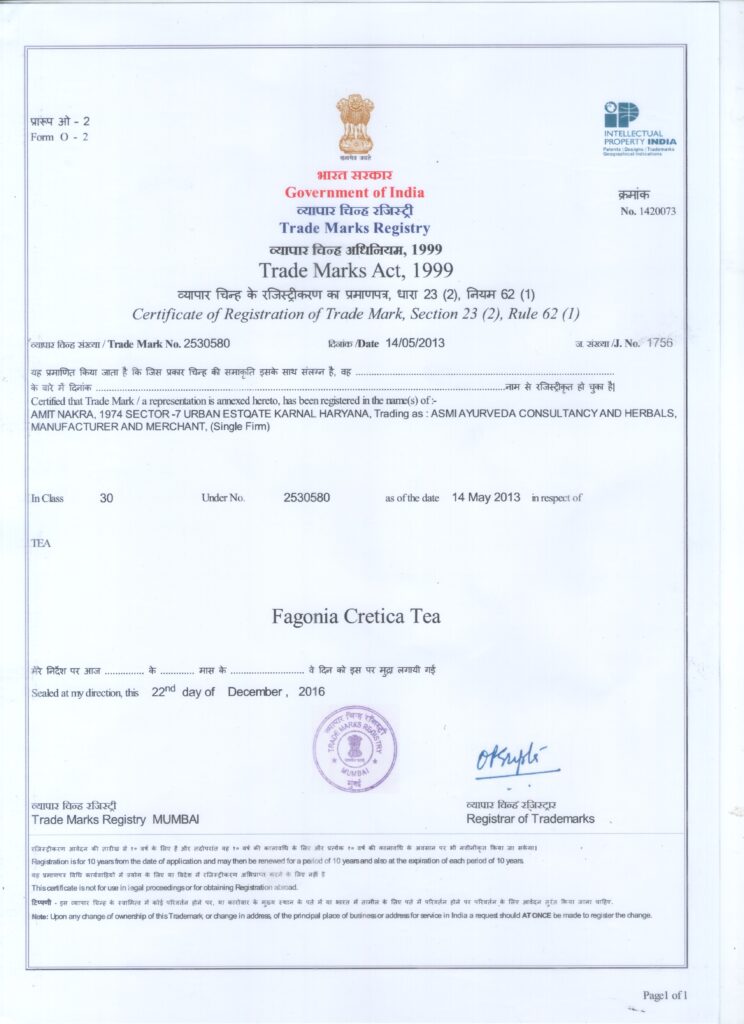
Medicinal action of Fagonia cretica are initiated within 24-72 hours of intake and the sooner a patient can start on with the recommended medicinal herbal extracts, higher is always the successful probability of achieving complete "remission" in cancer cell

Fagonia Cretica

Holy Basil (Ocimum sanctum Leaf Extract)

Wheatgrass (Leaf) and Tinospora cordifolia (Stem)

Curcumin

Lochenra Rosea (Leaf)

Podophyllum hexandrum (Fruit)
Buy Fagonia cretica extract and other herbal formulations as prescribed for patients of cancer :
Please do share with regards age and illness details of patient in our email / WhatsApp so we can confirm all details on medically recommended Dosage of Fagonia cretica Tea for the patient.
Its to be noted, in an early stage of Cancer, the mixing ratio with regards Fagonia cretica extract is Leaf 40 : Flower 60 while in Stage 4 (metastatic behavior), its Leaf 10 : Flower 90, and similarly as per illness severity / type of carcinoma, the mixing ratio of Leaf : Flower, daily dosage also varies on every individual patient basis.
We shall also Prescribe other recommended Medicinal Herbs and share all details on Diet Regulations, Lifestyle Regimen, Costing, Disptach and the order can be easily confirmed through PayPal / Transfer Wise / Bank Transfer / Western Union Money Transfer / Money Gram.
IMPORTANT : Its hereby requested to buy Fagonia cretica Extract (Tea) only from an Authenticated Source because as per Ayurveda Literature there are certain very important recommendations mentioned in RAS SHASHTRA which must be followed in the process of Drying, Ratio Maintenance (Leaf : Flower : Bark) and Powdering of Fagonia cretica.
Our Hospital – Asmi Ayurveda Consultancy and Herbals has been awarded with “Registered Trade Mark” of FAGONIA CRETICA TEA as we have been following the most stringent of protocols for our product and also we have been sourcing the authenticated product from verified cultivators.
We have been doing our tasks and working with patients of Cancer with complete honesty in our efforts and its now a success which belongs to each patient of ours for their trust in our Medical Services.
Registrar of Trademarks, Govt of India after analyzing all our protocols, documentation and product gave the verdict in our favor and thus its now a huge boost for all our patients as the Fagonia cretica Tea / VIRGIN’S MANTLE TEA which we are providing is Certified Authentic, so absolutely safe to use and also high in Medicinal Benefits.

Our Organization – ASMI AYURVEDA CONSULTANCY & HERBALS (Nakra Ayurveda Hospitals and Herbals Pvt Ltd) is serving the Cancer Patients across the Globe with Honesty, Dedication and Commitment in our efforts since 2001.
We are having a tie-up with DHL for export of our shipment across the world and it’s all at the doorstep address of our patients. Through DHL, it shall take 2-5 working days as maximum for the shipment to be delivered at address. We are enclosing the certificate of our tie-up with DHL as well here for your easy reference. 
If you would like to have a phone consultation with Dr. Amit Nakra for any of your questions, you can write to us through email / WhatsApp and the FREE VIDEO CONSULTATION shall be scheduled up with ease.
Throughout the treatment protocol, we shall be staying in touch with you through email / whatsapp and whenever there are any short questions of yours related to food / health, you are welcome to share all your queries on our specified WhatsApp number for receiving instant answers. It’s a FREE medical helpline service and you don’t need to pay any charges to anyone for availing our online consultation.
Within India, we dispatch through DTDC Courier Service / Registered Speed Post Service and its reached at the destination within a maximum of 2 to 5 working days.
Why earliest initiation of treatment is life saving for any patient of cancer ?
Early Detection of Cancer:
- Timely treatment begins with early cancer detection, enabling healthcare professionals to identify and address the disease at its nascent stage.
Localized Treatment:
- Early-stage cancers are often confined to the original site, facilitating localized treatments such as surgery or radiation therapy that target the tumor directly.
Reduced Tumor Burden:
- Initiating treatment promptly helps control and reduce the size of the tumor, minimizing the impact on surrounding tissues and organs.
Preventing Metastasis:
- Early intervention decreases the likelihood of cancer spreading to other parts of the body, preventing the development of metastatic lesions that are more challenging to treat.
Increased Treatment Options:
- Early diagnosis offers a broader array of treatment options, allowing for more conservative approaches with potentially fewer side effects.
Enhanced Effectiveness of Therapies:
- Chemotherapy and targeted therapies are more effective when the cancer is in its early stages, increasing the chances of a positive response to treatment.
Preserving Organ Function:
- Addressing cancer in its early phases enhances the likelihood of preserving organ function and minimizing the need for extensive surgical interventions.
Improved Surgical Outcomes:
- Surgery is often more successful when performed at an early stage, with a higher probability of complete tumor removal and reduced risk of complications.
Better Prognosis:
- The prognosis is significantly improved when cancer is detected and treated early, leading to higher long-term survival rates.
Lower Risk of Recurrence:
- Early treatment reduces the risk of cancer recurrence, as aggressive measures can be taken to eliminate residual cancer cells.
Minimized Spread to Lymph Nodes:
- Addressing cancer in its early stages reduces the likelihood of lymph node involvement, which is critical in preventing systemic spread.
Reduced Treatment Intensity:
- Less advanced cancers often require less aggressive treatments, minimizing the physical and emotional toll on the patient.
Preservation of Quality of Life:
- Early treatment allows for interventions that prioritize the preservation of the patient’s overall quality of life, minimizing the impact of the disease on daily activities.
Lower Financial Burden:
- Early-stage treatments are generally less costly than managing advanced-stage cancers, reducing the financial burden on patients and healthcare systems.
Personalized Treatment Plans:
- Early diagnosis allows for the development of personalized treatment plans tailored to the specific characteristics of the cancer and the individual patient.
Easier Management of Side Effects:
- Side effects of treatments are often milder in the early stages, making it easier for patients to cope with and adhere to their treatment regimens.
Integration of Multidisciplinary Care:
- Early involvement of a multidisciplinary healthcare team allows for comprehensive and coordinated care, addressing various aspects of the patient’s well-being.
Psychological Well-being:
- Early treatment can positively impact the patient’s psychological well-being, providing hope and reducing anxiety associated with advanced-stage diagnoses.
Opportunity for Clinical Trials:
- Early-stage patients may have more opportunities to participate in clinical trials, exploring innovative therapies that could further enhance treatment outcomes.
Community and Public Health Impact:
- Emphasizing early detection and treatment has broader implications for public health, fostering awareness and encouraging routine screenings to catch cancers at their most treatable stages.
In conclusion, the earliest starting of cancer treatment is paramount, offering a multitude of benefits that collectively contribute to increased survival rates, improved quality of life, and better overall outcomes for cancer patients. Early detection initiatives, public awareness, and regular screenings are crucial components of a proactive approach to cancer care.

